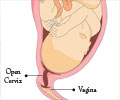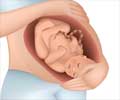
In some cases, the cause is diabetes, thyroid disease, or an autoimmune disorder.
Very rarely a woman will miscarry after undergoing a diagnostic test, such as amniocentesis.
Physical trauma, incurred during accidents, may cause a miscarriage. In other cases, substance abuse or smoking is to blame.
Researches tally 10 to 25 percent of all recognized pregnancies as ending in miscarriage. However, the total number of miscarriages may be greater still than that.
Chemical pregnancies, for instance, occur when a pregnancy is lost shortly after implantation, resulting in bleeding around the time of a woman’s expected period.
Advertisement
In fact, many women learn they had a miscarriage during a routine prenatal visit. Sometimes no embryo is seen on ultrasound.
Advertisement
Bleeding is often the very first sign of a miscarriage.
Some women will experience some light vaginal bleeding during their first trimester so this is not highly unusual nor is it a sign of increased risk of miscarriage.
If the bleeding is heavy, you should see your health care provider, this may be a sign of miscarriage. Other common symptoms include cramps and fluid or tissue passing from the vagina.
While you are miscarrying, your bleeding will become heavy and the cramping will become extremely painful.
If you experience severe pain or if you are at risk of an ectopic (tubal) pregnancy - a pregnancy in which the fetus develops outside the womb - risk factors include a previous ectopic, current IUD use, prior pelvic infection, or infertility - you should seek medical help immediately.
An ectopic pregnancy is a medical emergency.
Source-Medindia















